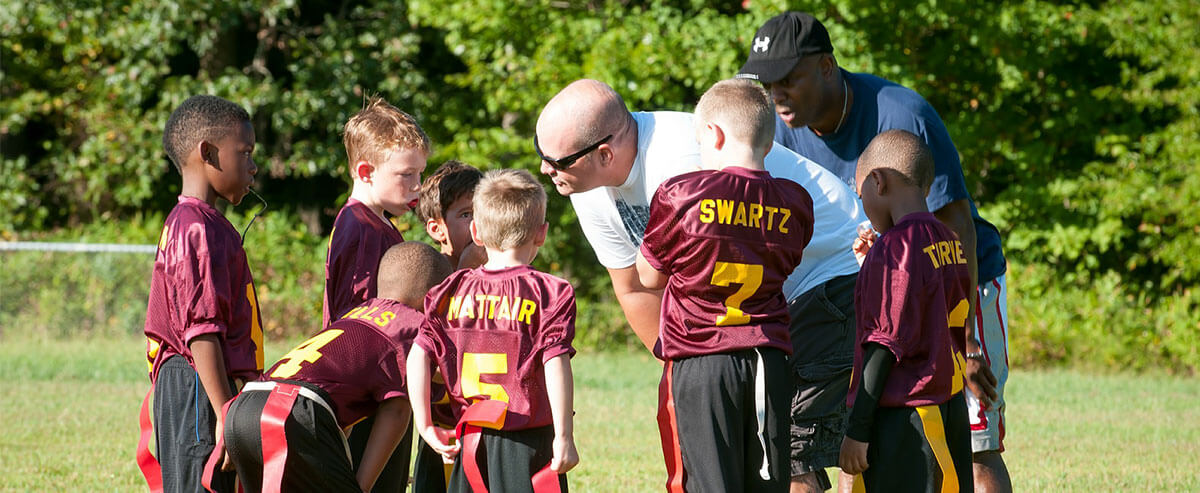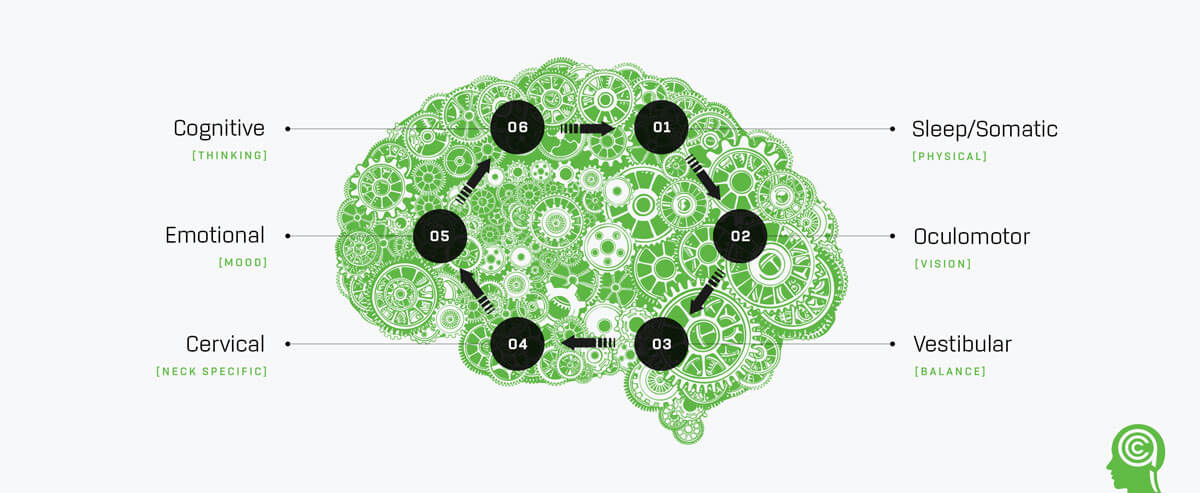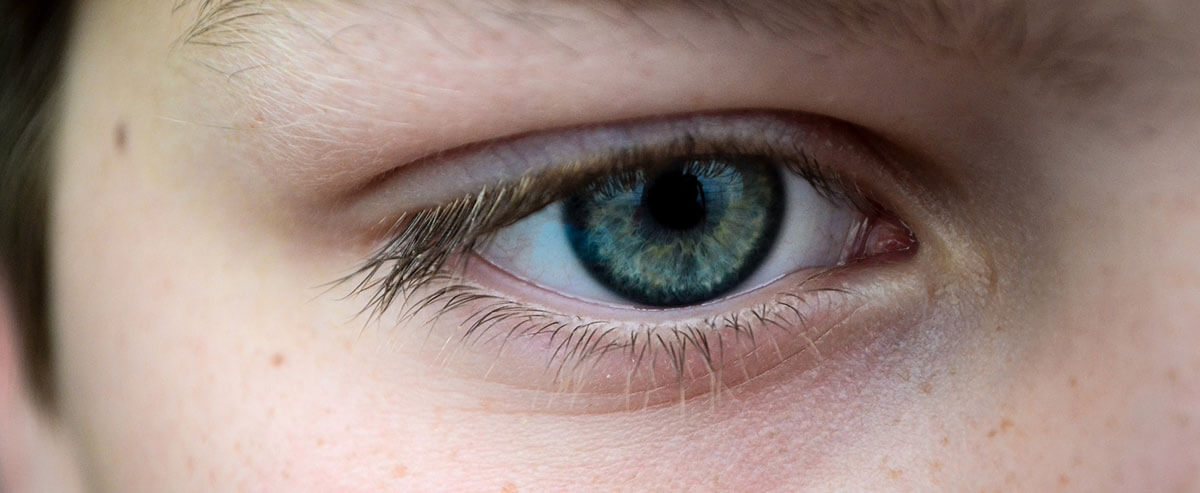There is no single test to diagnose concussion. Concussions are evolutionary in their presentation and symptoms may take time to develop, meaning they can present even after a sideline assessment. If a concussion is suspected the most important thing is to make sure that you, your child, or the athlete is removed from play or further risk of injury.
What do I do?
When concussion occurs, the brain suffers an energy crisis, reflexes and reaction times slow, thinking slows, and plays–if an athlete is kept in the game–suffer and leave the athlete exposed and vulnerable to hits they might not otherwise sustain. These are some of the contributing factors to 3-4 x’s greater risk of getting another concussion once one has occurred. More than 90% of repeat in-season concussions occurred within 10 days of 1st concussion!
“If in doubt, sit them out.”

What systems can be affected:
Many people don’t realize what the symptoms of concussion are, they find symptoms of concussion confusing because they present in so many different areas, but it’s important to keep in mind that your brain is responsible for all the different things we feel, think, and do. When the brain suffers a traumatic brain injury, even in its mild form which we call concussion (also called mild traumatic brain injury or mTBI), there will be a host of varying symptoms that can come from any of the different areas of function that our brain is responsible for, such as sleep/somatic (physical), cervical (neck-specific), vestibular (balance), oculo-motor (visual), emotional (mood) and cognitive (thinking): e

Signs and symptoms of a concussion:
There can be marked differences in what a concussed person may or may not complain of and what other people observe in the injured individual. The person who has suffered a concussion may not be aware that an injury has occurred, or realize that they should be on the lookout for symptoms. But if a coach, a parent, or an observer suspects a concussion has occurred, watch out for the following complaints or symptoms that you might observe even in the absence of any specific complaints:
Signs observed by a third party:
Watch individual for:
- Being dazed or stunned.
- Being confused about events.
- Answering questions slowly.
- Repeating questions.
- Can’t recall events prior to injury.
- Can’t recall events immediately following injury.
- Loss of consciousness (even briefly).
- Shows behaviour or personality changes.
- Forgets play or position (during game).
- Forgets class schedule or assignments.
Symptoms reported by patient:
Physical
- Headache or pressure in the head.
- Blurry or double vision.
- Nausea or vomiting.
- Dizziness.
- Sensitivity to light.
- Sensitivity to noise.
- Feeling tired, groggy.
- Balance problems, wobbly.
Emotional
- Irritability.
- Nervousness.
- Sadness.
- More emotional.
- Not feeling/acting like themselves.
Thinking
- Difficulty thinking clearly.
- Slowed thinking, processing speed.
- Foggy, hazy thinking.
- Difficulty remembering.
- Concentration problems.
Sleep
- Drowsy.
- Sleeping more than usual.
- Sleeping less than usual.
- Difficulty falling asleep.
- Disturbed (not restful) sleep.

Danger Signs
- Headache that gets worse and does not go away.
- Weakness, numbness or decreased coordination.
- Repeated vomiting or nausea.
Slurred speech.
Go to an emergency department right away if patient:
- Looks very drowsy or cannot be awakened.
- Has one pupil (the black part in the middle of the eye) larger than the other.
- Has convulsions or seizures.
Cannot recognize people or places.
- Is getting more and more confused, restless, or agitated.
- Has unusual behavior.
- Loses consciousness (a brief loss of consciousness should be taken seriously and the person should be carefully monitored).
- Will not stop crying and cannot be consoled
A little about rest
When a concussion occurs, brain cells (or neurons), stretch or shear and are damaged. This causes an energy crisis which can persist while repair and restoration of normal brain cell function is underway. During this time, the brain is especially vulnerable. Rest for a limited period, 24-72 hours, becomes a priority. During this rest period, the brain may be repairing small structural injuries and restoring normal energy management throughout its many systems. This is why rest is so crucial to concussion recovery.
But physical and cognitive rest alone is not an effective recovery strategy for all concussion patients. Strict brain rest, or prolonged periods in a dark room without any stimuli, is no longer recommended and has been shown to be detrimental to concussion recovery.
Return, recovery, and rehabilitation
For many, and research estimates this to be between 60-80% of people, recovery from concussion can be achieved spontaneously– meaning without particular therapies or treatment, with limited rest, and a gradual return to usual activities. Some may struggle in determining how much rest? Does this mean rest from sports, chores, classes, homework—what specifically? What exactly is a ‘gradual return’—and is it more or less gradual for certain types of activities? These are difficult questions for non-specialists to answer, and can be especially difficult to navigate for the injured individual or their parents, pointing to the need for specialized and individualized assessment of concussion.

Considering all the different areas in which concussion symptoms present, also known as the heterogeneity of concussion, it is clear that a similarly heterogeneous, inter-disciplinary, process is needed for concussion assessment, treatment, and for active rehabilitation when required. Growing evidence indicates that active rehabilitation can improve concussion recovery, and that these can begin early in recovery after a concussion has occurred. By matching an individual’s clinical or symptom profiles to targeted and active rehabilitation treatment, more complete recoveries in shorter periods of time can be achieved, together with reduced risk of repeat injury that would cause further damage to a vulnerable brain.
Concussion is treatable
Concussion is treatable, but a one-size-fits-all, or ‘cookbook approach’ for concussion management does not work. Failure to manage concussion as the heterogeneous, individualized injury it is will result in prolonged recoveries and unnecessary negative outcomes, which can include chronic symptoms, or permanent injury/disability, or worse.
Get personalized advice and treatment
Let us tailor an individualized prevention plan for your child today.

